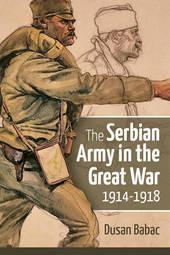
|
The Serbian Army in the Great War, 1914-1918
Hardback
Main Details
| Title |
The Serbian Army in the Great War, 1914-1918
|
| Authors and Contributors |
By (author) Dusan Babac
|
| Physical Properties |
| Format:Hardback | | Pages:272 | | Dimensions(mm): Height 245,Width 170 |
|
| Category/Genre | First world war |
|---|
| ISBN/Barcode |
9781910777299
|
| Classifications | Dewey:940.4094971 |
|---|
| Audience | |
|---|
| Illustrations |
500 ills, photos, incl c 36 colour plates
|
|
Publishing Details |
| Publisher |
Helion & Company
|
| Imprint |
Helion & Company
|
| Publication Date |
28 April 2016 |
| Publication Country |
United Kingdom
|
Description
The Kingdom of Serbia waged war against Austria-Hungary and the other Central Powers from 28 July 1914 when the Austro-Hungarian government declared war, until the capitulation of Austria-Hungary. In the first two years of the war, Serbia defeated the Austro-Hungarian Balkan Army. The following year, her army was faced with the Axis invasion. Unwilling to surrender, the Serbian Army retreated through Albania and evacuated to Corfu where it rested, rearmed and reorganised. From there the army transferred to the Salonika Front, where it recorded successes by 1916. After a long lull, the struggle to penetrate the Front began in September 1918. Serbian and other Allied forces broke through the Front and Bulgaria was soon forced to surrender. The Serbian Army advanced rapidly and on 1 November 1918 Belgrade was liberated. Thanks to the Serbian military victories and diplomatic efforts, the Kingdom of Serbs, Croats and Slovenes (later Yugoslavia) was created. Serbia paid for her victory in the Great War in a disproportionately exorbitant manner: it is estimated that she lost close to one million inhabitants, of whom about 400,000 were conscripts and the rest civilians, which accounted for nearly a third of the total population, or close to 60% of the male population. No other country that participated in the Great War paid so dearly for its freedom. The Serbian Army in the Great War, 1914-1918 offers readers a very thorough analysis of the Serbian Army of the period, including its organisation, participation in military operations, weapons, equipment, uniforms, and system of orders and medals. This book is a synthesis of all available literature and periodicals, appearing for the first time in the English language. The book is well supported by around 500 illustrations, out of which more than 300 are contemporary photographs and other documents, while this is complemented by dozens of colour plates of uniform reconstructions and colour photographs of the preserved pieces of uniform, equipment and weapons. A special emphasis has been placed on the colours of Serbian uniforms from the period. The book is the result of two decades of research and will enable readers to gain a clearer picture of this subject.
Author Biography
Dusan Babac was born in 1969 in Belgrade, from a family with a military tradition, and has been interested in military history and uniforms since an early age. He is an associate of the Belgrade Military Museum and Serbian History Museum. Since 1995 he has published a large number of articles in Serbia (Vojska, Odbrana), Slovenia (Obramba), France (Militaria Magazine, Gazette des Uniformes, Steel Masters, Ligne de front, Aero-Journal), Russia (Zeughaus), Germany (Deutsche Militarzeitschrift), Italy (Uniformi e Armi) and Japan (Air World). He is also a well-known author or co-author of books about the military history of Serbia, Montenegro and Yugoslavia, including the following: Armies in the Balkans 1914-18 for Osprey Publishing, 2001; Special Units of the Royal Yugoslav Army in the April War, Belgrade, 2006; with Cedomir Vasic and Miladin Markovic: Montenegrin Army 1896-1916, Belgrade, 2007; Elite Branches of the Royal Yugoslav Army in the April War, Belgrade, 2008; with Cedomir Vasic: The Guards in Serbia 1829-1945, Belgrade, 2009; The Serbian Hussar, Belgrade, 2010; with Zoran Vesic: Serbian Armed Forces, Belgrade, 2011, The Serbian Army in Wars for Independence 1876-1878, Belgrade, 2011; with Biljana Crvenkovic, Tijana Boric and Ana Radovanovic: The Royal Compound in Dedinje, Belgrade, 2013; as an editor: King Peter II of Yugoslavia A King's Heritage - The Memoirs, Belgrade, 2013. He is one of four authors of the exhibition and catalogue Official Dress in Serbia in the 19th and 20th Century, organised in 2001 in the Serbian Academy of Sciences and Arts. he has acted as a consultant for uniforms in more than 10 feature films and theatre plays in Serbia. Dusan is also a member of the Privy Council of HRH Crown Prince Alexander II of Serbia and holder of the Grand Cross of the Royal Order of the White Eagle. This is his first book for Helion & Company.
|